Hip pain can be crippling and significantly lower someone’s quality of life. Total hip replacement surgery may be an effective treatment for those who experience hip discomfort from an injury, arthritis, or other medical disorders. This article will define total hip replacement surgery in Delhi, describe how it is carried out, and go through what to anticipate during the healing process.
What is surgery for a total hip replacement?
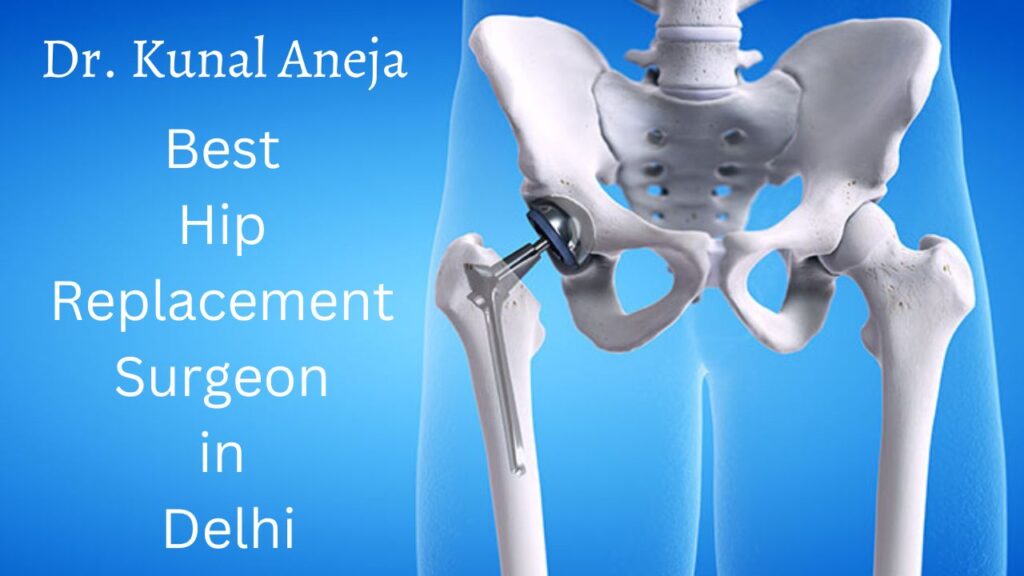
Complete hip replacement surgery, commonly referred to as hip arthroplasty, involves replacing a diseased or injured hip joint with a prosthesis, an artificial joint. The prosthesis is made to imitate the hip’s natural ball-and-socket joint, enhancing mobility and minimising pain.
What is the purpose of a total hip replacement procedure?
To treat a broken or diseased hip joint’s pain and bring it back to full functionality, total hip replacement surgery is performed. The following are some of the most typical causes for complete hip replacement surgery:
- Osteoarthritis is the most typical condition that damages the hip joint, causing joint pain, stiffness, and inflammation.
- Rheumatoid arthritis is an autoimmune condition that produces inflammation in the joints, which results in discomfort and stiffness.
- Avascular necrosis: When the blood supply to the hip joint is cut off, bone deterioration and joint injury result.
- Hip fracture: A serious hip fracture can harm the hip joint, causing ongoing discomfort, and leave the sufferer disabled.
- Congenital hip dysplasia: This disorder causes discomfort and stiffness because the hip joint does not develop normally.
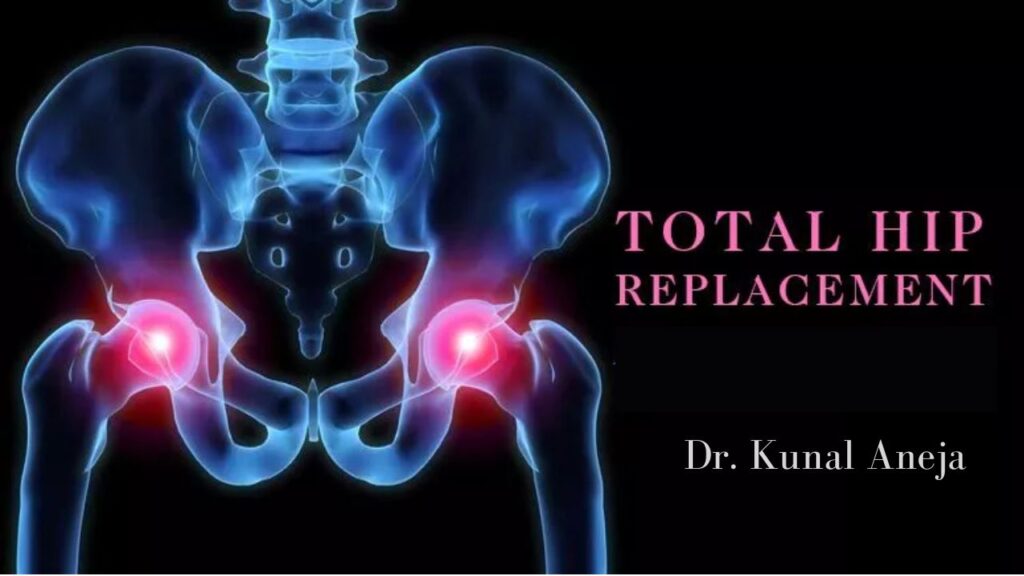
How is a complete hip replacement procedure carried out?
Under general anaesthesia, total hip replacement surgery typically takes 1-2 hours to complete. The injured or diseased joint is removed by the surgeon, who then replaces it with a prosthetic joint through an incision made along the side of the hip. The stem, ball, and socket are the three components that make up a prosthetic joint. The socket is positioned in the pelvis, the stem is put into the femur, and the ball is fastened to the top of the stem.
What to anticipate when recovering?
The patient will be observed in a recovery area following surgery before being moved to a hospital room. Depending on how well they heal, patients often stay in hospitals for 1-4 days. The patient will receive pain medication and physical therapy throughout this period to aid in their recovery of strength and mobility.
The patient will undergo physical therapy and rehabilitation after being discharged from the hospital in order to strengthen the hip joint and increase mobility. Individual recovery times may differ, but most patients can anticipate returning to their regular activities between three and six months after surgery.
Here are a few tips for a successful recovery after a total hip replacement
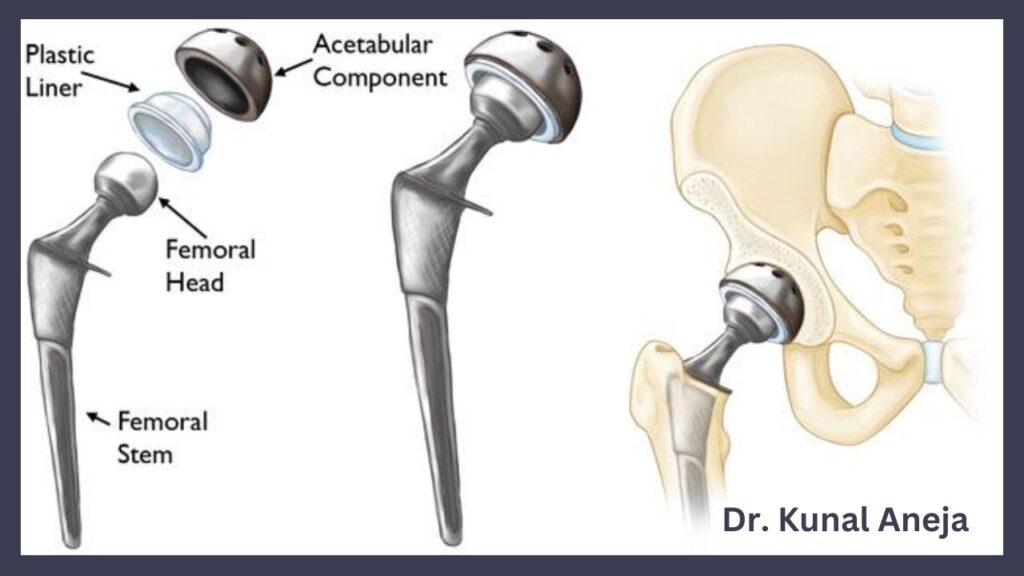
A good recovery from hip replacement surgery can be aided by exercise, a healthy diet and body weight, taking precautions against blood clots, and preparing your home for a life of limited mobility.
The most significant and demanding phase in any treatment plan may be surgery, but it is not the only one that bears significant weight and unique hazards. Orthopaedic surgery rehabilitation typically entails a number of crucial actions and procedures that will affect your long-term health and mobility.
With total hip replacement surgery, this is the situation. More than 200,000 hip replacement surgeries are performed annually in India, when the first hip replacement operations were carried out, the safety of hip replacement procedures has grown significantly.
Dr Kunal Aneja and specialists at Naveda Healthcare Centre, will walk you through every stage of the healing process and employ the best techniques and tools available to encourage a successful total hip replacement recovery.
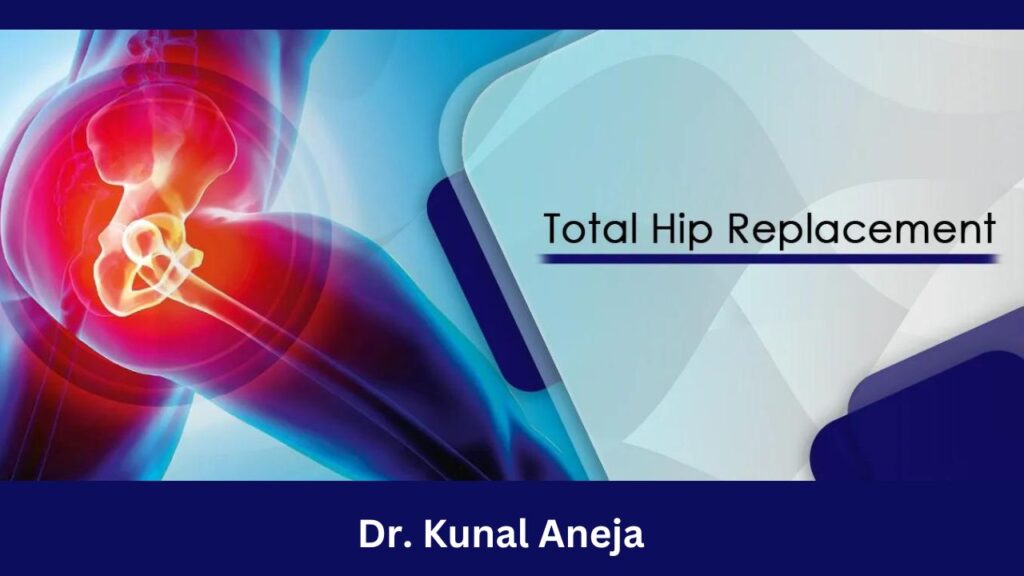
Actions You Can Do to Hasten Your Recovery
You can have a quick and successful recovery by putting these total hip replacement recovery suggestions into practice.
- Start a wholesome fitness regimen.
- The majority of hip replacement patients may walk immediately after surgery or the day after; most can return to their regular routines within the first three to six weeks of their total hip replacement recovery. It’s crucial to include wholesome exercise in your recovery regimen whenever mild activity is safe. Suggested exercises include progressively increasing walking distances and light housework (sitting, standing, climbing stairs). Movement is necessary for a successful recovery.
- Take attention to your weight and diet
- More weight can strain your new hip prosthesis, causing it to wear out faster and raising your risk of complications. Before and following surgery, maintaining a healthy body weight helps speed up healing and lengthen the useful life of your prosthesis. Moreover, while you’re recovering, be sure to eat a healthy diet.
- Workouts that Increase Blood Flow
- In order to increase blood flow and prevent clots, some workouts can be helpful. They consist of:
- regularly contracting the calf and thigh.
- Leg motion exercises that make use of the entire range of motion
- Walking with or without the aid of supportive tools (such as a cane or walker)
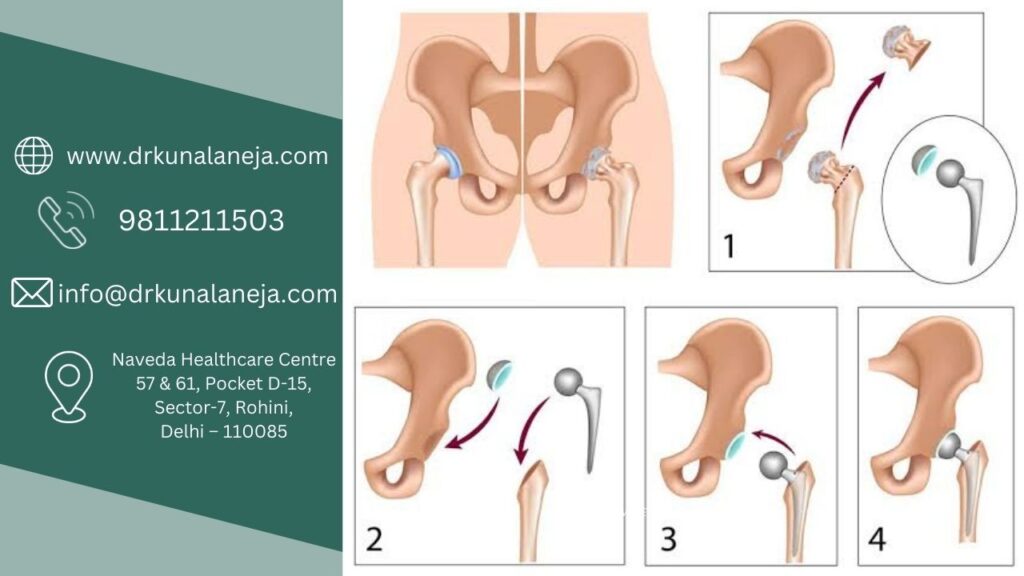
Make Arrangements for the home
Following surgery, you will have significantly less movement and will be unable to perform routine, everyday duties. Make necessary home improvements before your surgery so that the items you’ll need are accessible without unnecessary moving. Make arrangements with friends, relatives, or carers to have someone accessible to assist with chores like cooking, taking a bath, and doing errands.
A smooth and complete recovery following a total hip replacement is made possible by taking thoughtful precautions and making a conscious effort to heal. As you get ready for your hip replacement surgery and the ensuing recuperation time, keep in mind these important suggestions. Visit us here or call us at (+91) 9811211503 if you have any inquiries regarding complete hip replacement or would want to arrange an assessment.
Recovery Following Hip Replacement Surgery
Surgery may be painful for anyone, but it’s especially challenging for seniors since they tend to heal more slowly and have a greater risk of complications. That’s why it’s crucial that seniors obtain proper post-surgery care. Hip replacement surgery is one of the most performed elective operations.
If you or a loved one is having this treatment, you may be wondering what hip replacement recovery will be like and how long it will take to recuperate. We’ve provided recommendations on how to have a safe and speedy recovery following hip surgery.
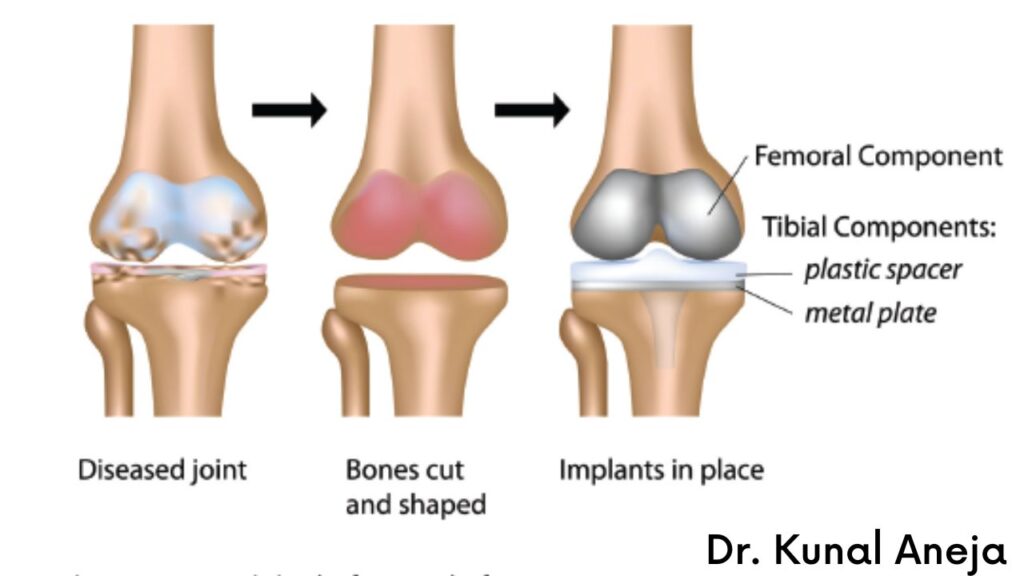
BEFORE LEAVING THE HOSPITAL
A patient normally stays at the hospital for one to four days after surgery, depending on the person. Before being discharged from the hospital, the patient will need to complete many tasks, such as:
- Getting in and out of bed independently
- Having acceptable pain control
- Being able to eat, drink and use the bathroom
- Walking using an assistive device (a cane, walker or crutches) on a level surface and being able to climb up and down two or three stairs
- Being able to execute the specified home exercises
- Understanding any hip precautions given to prevent damage and facilitate good health
AFTER LEAVING THE HOSPITAL
At first, doing regular everyday activities, such as cleaning, cooking and bathing, will be difficult to do independently. That’s why it’s crucial to have a support system in place to guarantee you’re able to get through your day safely and have a complete recovery.
Diet

By the time you go home from the hospital, you should be eating a normal diet. your doctor may recommend iron and vitamin supplements. You also may be recommended to avoid meals rich in vitamin K if you are taking a blood thinner medication. Foods with vitamin K include broccoli, cauliflower, liver, green beans, garbanzo beans, lentils, spinach, kale, lettuce, turnip greens, cabbage and onions.
It’s crucial to drink plenty of fluids and avoid alcohol. You should continue to control your weight and eat healthy to avoid placing further stress on the joint.

Conclusion
For people with chronic hip pain and impairment, total hip replacement surgery is a safe and efficient therapeutic option. Even though the healing process might be difficult, most patients can anticipate regaining their mobility and quality of life with the correct care and assistance.
If you’re looking doctor for total hip replacement surgery in Delhi, you can meet Dr Kunal Aneja (the best orthopaedic doctor in Delhi), a renowned orthopaedic surgeon by the name of Dr Kunal Aneja has performed many total hip replacement surgeries. He has experience doing successful hip replacement surgeries and has undergone advanced training in joint replacement surgery. Dr Aneja is renowned for his patient-centred philosophy and uses cutting-edge surgical methods and equipment to provide his patients with the finest results. Make an appointment with Dr Aneja if you’re thinking about having a total hip replacement.

